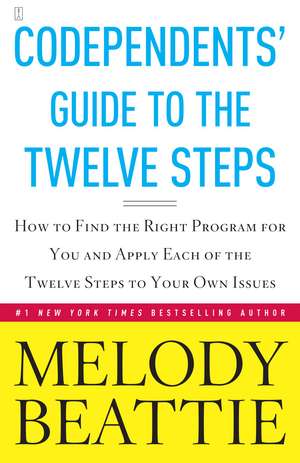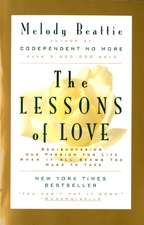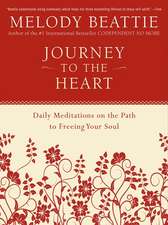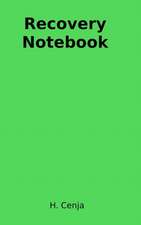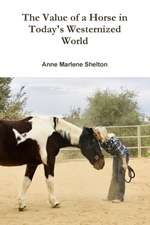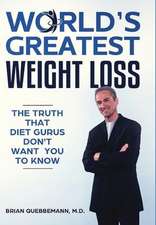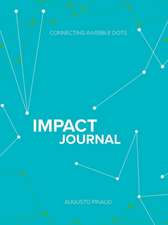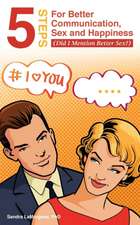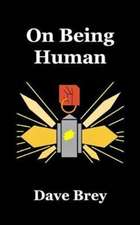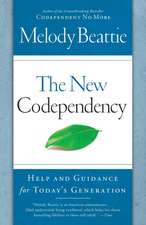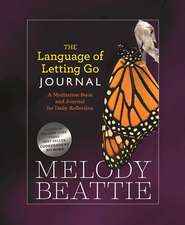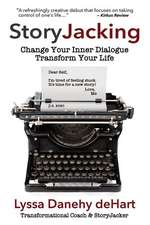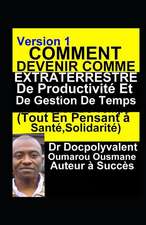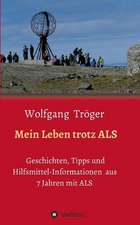Codependents' Guide to the Twelve Steps: New Stories
Autor Melody Beattieen Limba Engleză Paperback – 16 mai 2004
•Explain each step and how you can apply it to your particular issues
•Offer specific exercises and activities to use both in group settings and on your own
•Provide a directory of the wide range of Twelve Step programs -- including Al-Anon, Codependents Anonymous, Codependents of Sex Addicts, Adult Children of Alcoholics, and more
The uniquely warm and compassionate voice of Melody Beattie will inspire you to turn your life around -- one step at a time.
Preț: 104.42 lei
Nou
Puncte Express: 157
Preț estimativ în valută:
19.98€ • 20.76$ • 16.60£
19.98€ • 20.76$ • 16.60£
Carte tipărită la comandă
Livrare economică 04-18 februarie 25
Preluare comenzi: 021 569.72.76
Specificații
ISBN-13: 9780671762278
ISBN-10: 0671762273
Pagini: 224
Dimensiuni: 140 x 214 x 15 mm
Greutate: 0.26 kg
Ediția:Fireside/Parksi.
Editura: Touchstone Publishing
Colecția Touchstone
ISBN-10: 0671762273
Pagini: 224
Dimensiuni: 140 x 214 x 15 mm
Greutate: 0.26 kg
Ediția:Fireside/Parksi.
Editura: Touchstone Publishing
Colecția Touchstone
Notă biografică
Melody Beattie ha escrito numerosos libros sobre el crecimiento y las relaciones personales, y su mensaje se basa en la sabiduría curativa de los Doce Pasos, el cristianismo y las religiones orientales. Con la publicación en 1986 de Ya No Seas Codependiente, Melody se convirtió en una de las principales voces de la literatura de autoayuda cautivando a millones de lectores empeñados en tener relaciones más sanas. Ella vive en Malibu, California.
Extras
Chapter 1
"Surrender happens of its own accord. It just dawns on me.
Then, peace of mind settles in, and my life starts to get more manageable."
Bob T.
STEP ONE
"WE ADMITTED WE WERE POWERLESS OVER OTHERS-THAT OUR LIVES HAD BECOME UNMANAGEABLE."
Step One of CoDA
The first time I heard this Step, I didn't get it. I didn't understand. It felt dark, scary, and untrue.
Powerless over others? My life -- unmanageable?
I thought I was in complete control of myself and others. I thought there was no circumstance too overwhelming, no feeling so great that I couldn't handle it by sheer force of willpower. I thought being in control was expected of me. It was my job. That's how I got through life!
And I thought my life looked so much more manageable than the lives of those around me -- until I started looking within. That's when I found the undercurrent of fear, anger, pain, loneliness, emptiness, and unmet needs that had controlled me most of my life.
That's when I took my eyes off the other person long enough to take a look at the state of affairs in my life.
That's when I began to find a life and come alive.
"I didn't know about power and powerlessness," said Mary, talking about the First Step. "Being a victim and being in control was how I was in power. If I was powerless, then someone else was in control."
Now we are learning a better way to own our power than being victims and being controlling. It begins by admitting and accepting the truth about ourselves and our relationships.
We are powerless over others. When we try to exert power where we have none, our lives at some level may become unmanageable. Let's take a look at some ways unmanageability can present itself in our lives, and where our ideas about controlling others -- or allowing them to control us -- began.
MY STORY
I can still remember the scene vividly, even though it happened more than a decade ago. Someone I cared about a lot was drinking. He was an alcoholic. And he wouldn't stop. I had done everything I could to make him stop. Nothing worked.
Nothing.
Neither was I able to stop my efforts to control his drinking. After yet another round of promises, forgiveness, then broken promises, I settled on the ultimate plan to make him stop drinking. I would show him how it felt to love someone who was using chemicals. I would make it look like I had returned to drug usage. That would get his attention. That would show him how much I hurt. Then he would stop.
Carefully, I set the stage. Although I had been clean of drugs for years, I laid out the paraphernalia of a user: a small packet with white powder in it (I used sugar); a spoon, burnt on one side; a piece of cotton in the spoon. Then I lay down on the couch to make it look like I was under the influence of narcotics.
A short time later, the person who was the focus (at that time) of my control efforts entered the room. He looked around, saw the spoon, saw me, and started to react. I jumped off the couch and started lecturing.
"See!" I screamed. "See how it feels to love someone and see them using chemicals! See how much it hurts! See what you've been doing to me for these years!"
His reaction was not nearly as important as my neighbor's reaction later that evening. "What you're doing is really crazy," she said, "and you need to go to Al-Anon."
It took me months to learn the truth: I didn't need to prove to the alcoholic how much I hurt. I needed to become aware of how much pain I was in. I needed to take care of myself.
That's only one of many incidents that shows the lengths I went to to control people. I was so good at seeing the behaviors, especially the out-of-control behaviors, of another. Yet I couldn't see unmanageability in my own life. I couldn't see myself. And I was trapped, locked into the victim role. People didn't just do things. They did things to me. No matter what happened, each event felt like a pointed attempt to do me in.
My ability to separate myself from others -- to separate my issues, my business, my affairs, and my responsibilities from the issues, business, affairs, and responsibilities of others -- was nonexistent, I blended into the rest of the world like an amoeba.
If someone needed something, I considered that need my personal and private responsibility, even if I was just guessing about what he or she needed. If someone had a feeling, it was my responsibility to work through it for him or her. If someone had a problem, it was mine to solve.
I didn't know how to say no. I didn't have a life of my own. I had a backlog of feelings from childhood, and chances were great that whatever I was reacting to today was probably a patterned reaction from childhood. Two weeks after I got married, I raced home from work, flung open the closet doors, and checked to see if my husband's clothes were still in the closet. I was certain I was going to be abandoned, left. I felt totally unlovable. And I didn't have the foggiest idea what it meant to own my power.
The base I operated from was fear, coupled with low self-esteem. I spent most of my time reacting to other people, trying to control them, allowing them to control me, and feeling confused by it all.
I thought I was doing everything right. Aren't people supposed to be perfect? Aren't people supposed to be stoic? Shouldn't we keep pushing forward, no matter how much it hurts? Isn't it good to give until it hurts, then keep giving until we're doubled over in pain? And how can we allow others to go about their life course? Isn't it our job to stop them, set them straight? Isn't that the right way, the good way, the Christian way?
The codependent way.
As many others have said about themselves, I wasn't me. I was whoever people wanted me to be, And I felt quite victimized and used up by it all. After years of practicing hard-line codependency, the unmanageability in my life was overwhelming. Some of my codependency I didn't understand until well into recovery.
When I began recovery I was more than $50,000 in debt, as a result of the unmanageability in my financial affairs. No amount was too great to be borrowed if it would help someone else.
My spirituality had been taxed to the limit. How many times had I prayed for God to change other people? How often had God refused? I thought God had abandoned me. I didn't know that I had abandoned myself. I didn't know that now that I was an adult, people couldn't abandon me. All they could do was leave.
In some instances, I may have been better off if they had.
My relationships with my children were chaotic. It's hard to be an effective parent when you're bound up in pain, denial, and repressed feelings and are regularly wishing for death.
My relationships with friends were strained. I had little to offer friends, except my perpetual complaints about the misery in my life. Most of my friendships centered around shared stories of victimization, interspersed with Rabelaisian humor to make it bearable.
"Guess who used me today?"
I had no feelings that I was aware of. I had no needs that I was aware of. I prided myself on my ability to endure needless suffering, deprive myself, and go without.
I neglected my career.
My health was failing. I spent years seeking medical treatment for nonspecific viruses. I had a hysterectomy. I had viral meningitis. I had gastritis. My back hurt. My head ached. Arthritis was beginning to settle in.
And I was only thirty-two years old.
Codependency is a powerful force. So is denial and the ability to ignore what is before our eyes. What's there has the power to hurt, especially when we feel helpless, vulnerable, frightened, and ashamed by it all.
STANLEY'S STORY
Stanley is a successful architect in his fifties. It took him sixteen years to notice the unmanageability and chaos in his life -- sixteen years of denying, putting up with, pretending, and going deeper into hiding within himself before he saw the truth,
Stanley's father is an alcoholic. Stanley's wife's father died of alcoholism. And after sixteen years of trying to control his youngest son, Stanley reached the point of emotional collapse.
"By the time our youngest son, John, was six, I knew we were in trouble," Stanley said. "He constantly fought at school. He was belligerent and refused to do his homework. At home, he caused problems. He hollered at his mother, swore at her, and sometimes hit her.
"My wife and I fought all the time. I tried to be understanding. She had special circumstances. She had been in the camps during World War II, and she believed children should be loved and adored. She didn't want us to discipline John.
"John caused complete chaos at home. He was bright. He knew how to push everyone's buttons. He had my wife and I fighting, his siblings and I fighting. He even had his grandparents going at it."
When John was ten, Stanley gave his wife an ultimatum: Either they sought professional help for John and the family or Stanley was moving out. They went to a psychologist who told them not to worry. John, the psychologist said, was a bright child, a bit precocious, but he'd grow out of this stage.
That session was the beginning of $20,000 (after insurance coverage) of fruitless family counseling.
When John was eleven, Stanley's wife threw up her arms in despair and walked out of a school counseling session. She was tired. She had given all she could to the situation. She vowed never to set foot inside a school again. A short time later she moved out, leaving Stanley to raise the three children alone.
By the time John was twelve, Stanley was spending more time in school than John. Stanley was there three days a week, explaining why John was only there two days a week.
"The only way I could get John graduated from ninth to tenth grade was by promising to leave that school system," Stanley said. "How codependent is that? I sold our home and moved to another school system so the school would graduate John."
On one occasion, Stanley came home to find his middle son, Jeremy, choking John. Jeremy had his hands around John's neck and had lifted him off the ground. Jeremy quietly said that he had put up with John for twelve years and could do it no longer.
Another time, Stanley walked into a room just as John was throwing a knife at another child. Stanley was able to deflect the course of the knife, causing it to pierce a window screen instead of the boy.
When John was sixteen, things came to a head. By then, Stanley's wife had moved back home. One Sunday, Stanley was in the den watching football, and his wife was in the kitchen preparing brunch. John walked into the kitchen and began arguing with his mother. Stanley listened, as their discussion escalated and their voices grew louder.
"I was afraid," said Stanley. "John still acted abusively toward his mother, hollering at her and sometimes hitting her. I wasn't going to let that happen again."
Stanley walked into the kitchen just as John was about to strike his mother, Stanley grabbed John and restrained him in a bear hug. When he did this, his wife came to John's rescue. She started pulling at Stanley, trying to get him to let John loose.
Then Jeremy, the middle son, walked into the kitchen. He started pulling at his mother, trying to get her to leave Stanley alone, so he could restrain John.
The four of them toppled to the floor. Stanley cut his head open. Blood gushed out. Stanley let John loose, ran to the car, drove to the emergency room at the hospital, received forty-five stitches, and drove back home.
There in the living room stood Jeremy and John, toe to toe. They were still going at it.
"They were ready to duke it out," said Stanley. "My wife was standing next to them, watching. She didn't know what to do. The boys were fully grown. John was six feet tall and weighed 175 pounds. Both of them had been trained in martial arts.
"Damn it," Stanley said. 'If there's going to be any fighting around here, I'm going to do it."
Then Stanley stepped in between the two boys and punched them both.
The next day Jeremy moved out. A few weeks later, the oldest sister moved out. Two weeks after that, Stanley moved out. Two months later, Stanley's wife moved out.
"A sixteen-year-old boy had gained complete control of the house and two dogs," Stanley said. "That was it. I moved back in."
Two weeks later, a school counselor called Stanley. "I think you've got a problem," she said. The counselor then informed Stanley that John was using drugs and had been since he was eight years old -- a fact that $20,000 worth of counseling and therapy had failed to reveal.
By then, when he wasn't dealing with the school or police officials, Stanley was spending his days locked in his office, head down on his desk, crying.
"I was drained, and felt totally devoid of any worth as a human being," Stanley said.
Stanley began attending Al-Anon, then Families Anonymous. He was ready to face and accept his powerlessness and the unmanageability in his own life. He was ready to detach and begin taking care of himself.
(The epilogue to the story is this: John went to treatment but wasn't successful. Later on, after going to jail on a narcotics sale charge, he began a true recovery. He is now a successful businessman and has a close relationship with his father. Stanley and his wife divorced. Jeremy and the oldest sister are not yet in recovery for codependency. Stanley has lost one hundred pounds, exercises regularly, feels peaceful and hopeful about life, and takes care of himself daily.)
OTHER STORIES OF UNMANAGEABILITY
But I'm not in that much trouble, you might be thinking. My response is: good. You don't have to be in a lot of trouble to recognize unmanageability and begin recovering from codependency. It takes many of us much pain to become ready for recovery. Others do not need as much chaos.
Mike's awareness of the unmanageability in his life was a quiet one.
"I came home from work one night, and I could no longer stand my usual system of sitting in front of the television, staring at it, and escaping from myself by reading the newspaper. My sister, who has always been borderline psychotic, called. She started going on and on, giving fifteen different reasons for why she had lost her job. It was about the fifteenth one in a row she had lost. And the thought occurred to me that I could either go on and on with my life as it was, being bored and quietly escaping through the television, or I could start doing something different. Someone had given me the address of a Twelve Step group for adult children of alcoholics. I got up, turned off the television, and went to a meeting. I was ready to take this First Step -- out of sheer boredom."
Karen's unmanageability with her codependency became apparent while she was in recovery from addiction to drugs and alcohol.
"I had been recovering from chemical addiction for fifteen years. I was doing everything everyone told me to. I was going to five meetings a week. I was helping people constantly, whether they wanted it or not. But inside, I was just as ashamed of myself as I was the day I got sober. I had no self-worth. I couldn't tell people 'no.' I couldn't say what I thought. And everything I did, I did to make people like me -- from the way I dressed, to the way I combed my hair and put on my makeup, to the way I sat, and the things I did for people. I felt so victimized. I never felt good enough. If I ever did say no or take care of myself with people, I felt so guilty. And, I felt angry and resentful, because my days and hours were consumed with doing things for people I felt I had to do, and people never seemed to appreciate what I did for them.
"I felt so bad about myself, I hoped that if I helped enough people, God would start treating me good. That's when it dawned on me that I needed to start treating myself good. God wasn't making me do all these things. God wasn't stopping the good from happening in my life. I was.
"I knew I needed, wanted, and deserved more from my sobriety than what I was getting. I came to understand that to get that 'more,' I had to begin addressing my codependency. It was time."
To use author Charlotte Kasl's phrase, Karen was constantly "giving more than she could afford" to others and not giving to herself -- a codependent behavior that ultimately creates unmanageability. We can give more of ourselves than we can afford financially or emotionally. Any time our giving begins to get compulsive or is induced by feelings of guilt and obligation or leaves us feeling victimized, we are in danger. Any time we're uncomfortable with what we're doing because it goes against our own truth and what we want, we are in danger.
Consistently giving more than our share and not getting our needs met in relationships can create unmanageability.
After ending a relationship and staying away from love relationships for a while, Martha met Jack. He really charmed her one evening in the early days of their relationship when he drove her to the train station and carried her bags to the platform for her.
"No man had ever done anything like that for me in my life," she said. "It was love at first sight."
The problems began subtly and were hard to identify. Jack told her early on that once she got to know him, she wouldn't like him. Jack was right.
"He seemed to want to control my opinions and thinking," Martha said. "Whenever I voiced an opinion that was different than his, even if it was about a piece of art, he would argue with me until I gave in and agreed with him."
Whenever it came time to be dose, Jack withdrew. He would have sexual relations with Martha, but he refused to spend the night with her. He would go for long periods without seeing her, then make a date, and at the last minute, cancel.
The relationship evolved into long conversations on each other's answering machines.
"My friends kept telling me this relationship was no good," Martha said, "but I had a hard time seeing it. I couldn't break loose. I got stuck, trapped in it. It caused me a lot of pain. My self-esteem dropped. I cried a lot and sat waiting by the phone. I stopped trusting myself."
Finally, Martha began attending meetings of CoDA. Soon she was able to terminate the relationship and begin taking care of herself. Martha learned that giving away her power and allowing herself to be victimized created unmanageability in her relationship and her life. She also began to look at and change some of the underlying reasons she had done this. (We will, too, in the chapters on the Fourth and Fifth Steps.)
OUR LIVES HAD BECOME UNMANAGEABLE
Our codependency, and our unmanageability, doesn't always surround addicts and alcoholics. Many of us discover that our efforts to control another's behavior extend beyond that of controlling one person's addiction. Many of us get caught up in overt, and subtle, gestures to control many people -- what they do, think, feel, and how and when they change.
Many of us find ourselves trying to control others well into recovery. I have come to recognize that my need to control, or take care of another, is instinctive. It's my first reaction to people. It's no longer as obvious as it once was, but it's still there.
We can try to control people we love, people we work for, people who work for us, friends, enemies, relatives, children, neighbors, and even strangers.
Controlling and caretaking don't work. Codependency doesn't work. It makes us feel crazy. It makes us feel like people and circumstances are driving us crazy, Our lives become unmanageable. Controlling and caretaking create unmanageability.
And we don't see clearly what is going on while it is going on, It is as though we are in a fog.
This unmanageability can be external, internal, or both. We may become so enmeshed in other people and their issues, so focused on them and out of touch with ourselves, that we lose control of the external affairs in our life. Unmanageability may creep into our relationships, our spirituality, health, employment, recreational activities (or lack of them), home life, community involvement, and finances.
Our internal affairs -- our feelings, thoughts, and reactions to others and ourselves may become unmanageable. Depression, fear, anger, sadness, and a whirlwind of chaotic thoughts may overtake us. Or we may become so consumed with thoughts of another and with wondering what that person is feeling, that we lose touch with ourselves and our own thoughts and feelings.
Our mental energy, our minds, our intellects, may be in an unmanageable state, clouded by denial, fear, and attempts to control another. We may be caught in a torrent of obsessive thinking. Or, we may get stuck in negative thought patterns, patterns detrimental to our health and well-being.
We may neglect our careers and our creative gifts and talents.
Our financial affairs may be unmanageable. We may be overspending, or underspending and depriving ourselves.
We may deprive ourselves so badly our martyrdom and self-sacrifice create ongoing feelings of victimization. We may allow others to victimize us; we may victimize ourselves. We may subject ourselves unnecessarily to other people and their inappropriate, abusive, or out-of-control behaviors. We may feel victimized by our inability to set the boundaries we need to set.
Our behaviors may be out of control. The behaviors we use to control another may be as crazy as the behaviors of the person we're trying to control.
We may feel compelled to take care of others in a way that diminishes their ability to take responsibility for themselves. When we do this overtly, taking responsibility for the consequences of another's addictive behaviors, we feel angry and used. When we are covert caretakers, walking through life feeling responsible for the feelings and needs of others, we neglect our own feelings and needs.
Not saying no, not saying what we mean, not being in touch with what we want and need, not living our own lives, creates unmanageability.
We may become so controlled by the expectations and desires of others that we feel like puppets on a string with no lives of our own.
Some of us become trapped in unhealthy relationships, unable to extricate ourselves. Some of us become isolated, terrified of risking further involvement with people because we feel so unable to take care of ourselves in relationships and so frightened of being disappointed or hurt again.
If codependency goes untreated long enough, the results can be serious, even deadly. We may begin using alcohol or drugs to stop our pain. We may get caught up in other compulsive behaviors. We may develop physical illnesses from stress and from not dealing with our emotions. We may end up thinking about, or actually attempting, suicide.
Or, we may become terminally miserable, enduring life, getting through, waiting for our reward in heaven, not knowing that there is a reward each day in being alive and living our own lives.
Unmanageability can creep into our recoveries, no matter how long we've been recovering. It happens whenever we try to control something we cannot control. It happens when we allow our fear and panic to control us. It happens when we allow others' expectations, demands, agendas, problems, and addictions to control us.
It happens when we neglect our responsibility to take care of ourselves lovingly. It happens when we try to exert power where we have none, then continue trying ferociously, even though what we're doing isn't working. Whenever we try to have power where we have none, we forfeit our personal power. Our real power is to think, feel, make choices, live our own lives, and take care of ourselves.
Unmanageability occurs when we stop owning our power and start believing that we do not have choices about how we want to act, regardless of what another person is or isn't doing.
Perhaps the relationship most affected by our attempts to control or change what we cannot, is our relationship with ourselves. We become frustrated, confused, and often immersed in negativity, self-hatred, repression, and depression. We stop loving and caring about ourselves because we have cared about others too much or in ways that don't work for them, for us, or for the benefit of the relationship.
We may have developed a life pattern of self-neglect. If so, we can now learn how to take care of ourselves in a loving, gentle manner that feeds our soul and makes life worthwhile.
Many of us develop new definitions of unmanageability after we've been recovering for a while. We begin to expect more from our lives.
When I lose my peace and serenity, when I become excessively frightened, panicky, guilty, or ashamed, I consider my life unmanageable. When I stop dealing with my feelings, when I stop nurturing and caring for myself, when I stop listening to myself, when I get caught up in trying to control events and people, I consider my life unmanageable. The solution is to return to Step One.
So much of what we call codependency is simply human attempts to avoid, deny, or divert our pain. Taking this Step means we become ready to face and feel our pain. Be gentle with ourselves and others as we move from denial into the acceptance generated by this Step.
THE ROOTS OF CONTROL
The belief that we have power over other people is a powerful belief -- a destructive illusion that many of us learned in childhood.
Listen to how some recovering people were trained to believe they had control over others.
"When I was in high school, my mother started the habit of trying to kill herself," said Marcia, a grown woman now recovering from codependency. "She kept trying to gas herself in the oven. I was terrified for her. Every day at school I'd call her between classes. When she didn't answer the phone, I knew she was doing it again. I'd race home, turn off the oven, air out the house, put Mother to bed, and race back to school.
"At a young age, I learned I had an enormous amount of power over people. I learned I had power over my mother's life or death."
A twist to this story is that Marcia's mother also believed she wielded power over Marcia's life. When Marcia was sixteen, her mother parked her car on the railroad tracks on Easter Sunday morning. Then, she waited for a train to hit her, which it did.
Marcia's mother escaped with only a few cuts and bruises, but she was committed to a mental institution for four years because of that suicide attempt. While Marcia's mother was in the hospital, she told Marcia that she wanted her (Marcia) to have a better life, so she was sending her to another city to live with her Uncle Charly.
"Later on, when I was in college, my mother got out of the hospital. She told me that she never intended me to live with Uncle Charly, she had wanted me to live with her cousin Charly. I laughed at the irony of control: to almost kill yourself so your child could have a better life, then find out that the child was sent to the wrong Charly and had a horrible life because of it," Marcia said.
Some of us were raised with more subtle, but equally powerful, illusions about control.
"From the time I was a young child, about three, my mother ingrained in me the idea that 'I made her miserable,'" said Jackie. "I grew up honestly believing that I had this power over her. I also came to believe that I held the power to make her happy. Then, I spent my life alternating between the two ideas: acting out to make her miserable or turning myself inside out to make her happy, which I never succeeded at. I felt guilty, trapped, and in bondage by both ideas.
"As an adult, I lived with this belief for years. And it wasn't just about my mother. It spread to everyone I had contact with. I really believed I had the power to make people miserable, make them happy, make them feel. It was a tremendous responsibility, an inaccurate one, and it kept me walking on eggshells and feeling crazy most of my adult life, until I began recovering from codependency. I turned myself inside out to control how others felt or to avoid making them feel a certain way. I got so I hated to be around people, because controlling their feelings felt like such a big, tiresome job. I couldn't relax and enjoy being with people. My energy was out there -- trying to make them feel, trying to control them. And I was out of touch with what I was feeling.
"I didn't know it was okay to have feelings," said Jackie.
Many of us grew up believing it wasn't okay to have feelings. That was part of the control we were taught to have -- repression of our emotions. Now we are learning that whatever we try to control gains control of us. If we try to control our feelings in an unhealthy way -- which many of us were taught to do and learned to do to survive -- our feelings will gain control of us and create unmanageability.
"From the time I was old enough to listen, I was told not to feel," said Jackie. "It didn't take me long to begin telling myself that. I was told to stand tall, sit straight, and ignore my feelings.
"Actually, this advice was helpful. I lived in a cold, sterile environment. I received no nurturing and little love. From the time I was born, the people I expected to love me, disappointed me. I wasn't hugged. I wasn't told I was beautiful. I wasn't allowed to be afraid, to be angry, and of course, I didn't feel joy. I was told to be more, be better, try harder, and be stronger. Be in control.
"I learned that no situation merited falling apart or indulging in feelings. Feelings were a waste of time, a childish, weak, human, unnecessary display.
"By not feeling, I survived in this family. I survived life. And in short order, I learned to treat myself as I had been treated -- neglecting, avoiding, criticizing, demeaning, and berating myself for having feelings and needs, for being human.
"Shutting off this part of myself made me strong, stronger than I knew. It helped me endure and survive the fact that my needs weren't being met. But my feelings, needs, and humanness caught up with me. That part of me refused to be ignored any longer.
"Now I've been recovering for a while. As I look back, I can see that although I didn't feel my feelings -- because I didn't feel them -- they, and my unmet needs, controlled me. They drove me, they propelled me. I lived in fear, and my response to that fear was to try to control everyone and everything around me."
Fear is the undercurrent, the force, for much of what we do that we call control -- control of others, ourselves, situations, circumstances, and timing.
"In this past year of attending CoDA," said Jane, "I got to see how terrified I've been all of my life. All that time, I've lived through fear."
Sometimes, this fear is expressed as anger.
"I've been alone, disconnected from people most of my life," said Brad, whose father is an alcoholic. "I was always lonely, stressed out, stretching too much. I couldn't make a relationship work. I think I was really angry for most of my life before recovery. Anger was my source of life energy. I didn't get angry. But it was an underflow that ran my life."
For some, this undercurrent escalates into panic, sometimes terror -- of life, people, circumstances, ourselves, and our feelings. We don't know how to relax and detach. Some of us aren't aware of how afraid we are. I can now see how much fear I lived with for most of my childhood and adult life. I didn't see or feel it at the time, but it controlled most of my actions.
What I did was focus on others: caretaking, controlling, and obsessing about them. What I didn't do was take care of myself in a loving manner.
Step One gives us permission to relax, stop controlling, deal with our fear, and take care of ourselves.
Not being able to take care of ourselves with people gives them control over us. Just as many of us have learned well how to try to control others, we have also learned to allow them to control us.
"I was raised with the belief that I would be killed if I said no," said Marcia, who talked earlier about rescuing her mother from suicide attempts. "I was raised Catholic. I was taught to honor my father and mother. And a great deal of fear was instilled in me about ever telling anyone no. From television, I learned that you follow people around and do for them. I learned the concept 'Love thy neighbor and forget thyself.' I learned that if I did what was expected of me, I would be loved and taken care of."
Sherri explains her version of codependency: "I believe much of what I call codependency in my life is a result of feeling frightened, trapped, and stuck in relationships because I don't know how to take care of myself with people."
When we love others too much, when we so desperately want and need what they have -- whether that is acceptance, approval, love, or friendship -- we may forfeit our ability to take care of ourselves with them, out of fear that we may not get what we need. We may hope that if we hold things in place by willpower, we will finally be safe and get what we need.
We won't.
These ideas are illusions. We aren't defective. Most of us have simply been doing what we learned, sometimes at a young age: protecting ourselves by trying to control others or by allowing others to control us. We grow up to be caretaking, controlling adults who have lost touch with a true and appropriate goal: loving and accepting ourselves and trusting the flow of life and goodness.
We grow up to do codependent behaviors.
It may be normal to want to control people and events and cut our losses, but it is not necessarily healthy. It's not good for us; it's not good for others.
And we may be so shut off from ourselves that we barely notice until life comes tumbling down around us. Our lives become unmanageable.
The First Step gives us permission to stop controlling and taking care of others and begin taking care of ourselves,
"I was angry when I started attending Al-Anon and people told me I needed to start taking care of myself," said Joannie. "I had been taking care of myself and everyone around me all my life!"
That's not the kind of self-care we're talking about in recovery. The kind of self-care that accompanies recovery and these Steps is gentler, more loving, more freeing, and more focused on tending to our own responsibilities. It's a healing, rejuvenating, renewing kind of self-care, one with room for feelings, needs, wants, desires, goals, plans, and lives of our own -- lives with meaning and purpose, ones that make sense.
ACCEPTING POWERLESSNESS
Some of us have an easy time accepting the premise in this Step: that we are powerless over others. By the time we get to this Step, we're ready to give up and give in, Others have a struggle accepting powerlessness.
I love this Step. But I hate that I can't control. I hate being vulnerable and helpless. I don't like feeling uncomfortable or being in emotional pain. I get sick of having to detach and surrender. But the love affair with this Step comes in when I admit the truth. I am powerless over much in life, and when I try to have power where I have none, I get crazy. I can't control others, no matter how much I want to, no matter how much better I think I know what's right for them.
I can't control what others do, think, or feel, whether or how they choose to interact with me, whether or when they choose to grow and change, and whether or when they choose to recover from their addictions.
Sometimes I can't control myself.
I'm powerless over the backlog of feelings and negative beliefs I've accumulated. I'm powerless over my own and other people's addictions, including addictions to alcohol and misery. I can't control my children or other people's children. I'm powerless over results, life, circumstances, events. I can't control the course of relationships. I can't control timing.
God, I wish I could control timing.
But I can't.
When I try to control myself by rigidly repressing my thoughts and feelings, I lose myself. I fall deeper into the pit of myself and the morass of codependency.
When I try to control other people, I make them and myself crazy. When I try to control addictions, the addictions control me. When I try to control what others think of me, I turn into a puppet on strings. Controlling makes me and others crazy. It puts me under the control of whatever I'm trying to influence, I lose myself. I lose touch with myself.
And other people get angry with me and tend to back off.
When I try to control situations and circumstances, I set up blocks to events moving forward. When I spend my time and energy trying to have power when I have none, I lose my ability to live my own life.
Controlling sets up a peculiar energy. People can feel it -- even if we're just thinking about it and not acting on it. People react to it -- sometimes by deliberately doing what we are trying to make them stop doing, or not doing what we are trying to make them do. It's an energy controlled by fear.
It's natural to want to control others, especially when they're hurting themselves or us, or when things aren't working out to our liking. But it isn't our job to take care of others -- to take care of their feelings, thoughts, decisions, growth, and responsibilities. It is our job to do that for ourselves.
Step One does not imply irresponsibility or helplessness. We are not saying, "I can't help myself because of what others are doing or have done to me." We are saying the opposite: that we are responsible for ourselves and our affairs. Others are responsible for themselves and their affairs -- whether or not we like how they are handling them.
We are responsible for ourselves, for directing our life energy toward our path, for creating a wholesome, fulfilling life for ourselves. When we become open to allowing that to happen, then it will.
We are responsible for stopping our own pain, facing and dealing with our own fears, saying no, giving ourselves what we need, setting boundaries we need to set, and making choices and decisions we need to make to take care of ourselves -- in any circumstance or situation.
We are not victims.
When we accept powerlessness, we will become empowered to take care of ourselves. When we begin taking care of ourselves, we will begin living our lives, and all that is meant to come to us will be ours. When we stop controlling others, we can allow and trust them to live their lives.
This Step grounds us in reality and in ourselves. It centers us. It balances us. It brings us back home to ourselves.
When we stop controlling, things fall into place. And we find that our place in this world is a good place. Eventually, we become grateful for the way things work out because it's better than what we could have accomplished with our controlling behavior.
We are powerless over so much more than anyone taught us. Accepting that means we're free to own our true power in life, which is also so much more than anyone told us. We have power to think, feel, solve problems, set boundaries, set and reach goals, create, heal, take care of and love ourselves unconditionally, and love those around us unconditionally.
What am I powerless over? Almost everything I want to control.
THE DETACHMENT STEP
The First Step is the Step that helps us begin detaching -- a recovery concept that means we release and detach from others -- lovingly, whenever possible.
This Step helps us begin to identify the proper use and abuse of willpower. We begin feeling instead of running from our emotions. We identify how we have neglected ourselves, so we may better love ourselves in any circumstance.
It is the first step toward removing ourselves as victims of others, of ourselves, of life.
This is the Detachment Step.
This Step is about boundaries. We learn the limits and extent of ourselves and our responsibilities. We learn to identify what we can and cannot do. We learn to identify when we're trying to do the impossible or trying to do that which is not our job.
Then, we stop doing the impossible and focus our attention on the possible -- living our own lives, taking care of ourselves, feeling and responding appropriately to our feelings. We can love ourselves and others without feeling the overwhelming need to control and manipulate them and their situations to our liking.
Often, this Step puts us in touch with our feelings: feelings of fear, hurt, or shame. It puts us in touch with grief. At first, this Step can feel dark and frightening. It doesn't have to, not for long. It renders us powerless over what we cannot control, so we can become empowered. Once we accept whatever loss or area of powerlessness we're facing, we're free to feel and deal with our feelings, then move forward with life.
We'll take this Step when we're ready. When we're worn out, when we've exerted all our attempts to manage and control, when we're tired of feeling crazy and fighting battles we cannot win, we'll surrender. When it's time, this Step will find us and do its work.
Let it. Let it bring us home. Let it take the burden of controlling and feeling so responsible for others off our backs. Let the peace, relief, and comfort of this Step sink in.
Detach. Detach from the fear. Detach from the need to control. Focus on ourselves, and let ourselves be. Stop trying so hard and doing so much, when doing so much doesn't work.
Love and accept ourselves, as is, no matter what our present circumstances. The answer will come. The solution will come. But not from trying so hard.
The answer will come from detachment.
We are powerless over others, and our lives have become unmanageable. And for now, that's all we need to be. That's who we are, and it's good enough.
Become sensitive to feelings of powerlessness and unmanageability. Become sensitive to what it feels like -- on the overt and the more subtle levels.
Take this Step in the beginning of recovery. Then take it again as needed. Take it whenever the codependent crazies set in. Take it whenever we believe that things are out of control and our lives are a mistake. Take it when we find ourselves taking care of others and wondering if we have a right to take care of ourselves. Take it when we start ignoring our feelings. Take it when we start obsessing about others or worrying about our future or the future of another. Take it when we start believing others control our happiness.
Take it when we neglect ourselves.
Take it when we get stuck.
When we don't know what to do next, we can take this Step.
Think about it. Let it sink in. Let it define us, and our present and past circumstances. Let it heal, help, and comfort. It always brings us home -- to ourselves, to reality, and to mastering the spiritual lesson in our current circumstances.
The first word in this First Step is we. Self-acceptance, based on this simple definition of ourselves, feels good. We are not alone, not anymore. There are many of us practicing this Step daily. There are many of us who share the problem. We may have felt alone, but we are not unique in our pain or our dilemma. Neither are we isolated in our solution. There is power in the community of recovery, power in taking this Step in the privacy of our own homes, and in group settings with others. We come together in this Step, as a "we," to share our common problem and solution. The sharing in community makes the problem grow smaller and the solution more imminent.
There is a place I get to in my relationships with people, and life, that is dark and ineffective. It is a place ruled by fear and an instinctive desire to control.
I have done it overtly -- trying to control an alcoholic's drinking by focusing my life around that person.
I have done it quietly -- trying to control and repress my feelings, trying to control a particular situation, ferreting into myself until I barely existed, repeating unsuccessful similar efforts to solve a problem, or pretending a particular problem doesn't exist. I get to that dark place when I allow others to control me or when I allow negative beliefs or unresolved feelings from my past to control me.
I get to that place when I don't do what I need to do to take care of myself with people, because I am afraid to do so.
This Step takes me out of that dark place. It helps me remember who I am. I can't control others, and I get crazy when I try to. I don't have to control others. I don't have to take care of them. I don't have to control life, or situations, for life to work.
It is safe now to trust. It is safe now to detach. I can accept myself, my problems, my current situation, and all my unmanageability. I can detach, because holding on so tightly doesn't work. I can relax and just be me. And I can love, accept, and take care of myself.
The first time I took this Step on my codependency issues, when it really sank down from my head to my soul, it brought freedom and the gift of detachment. For the first time, I understood, in my heart, that I could not control another. This Step brought relief and the ability to begin tending to the affairs of my own life.
This Step still brings relief, each time I take it.
This Step gives us permission to be who we are. This is the Step where we accept ourselves, our powerlessness, and our present circumstances, in peace, grace, and trust that all is, and will be, well.
We surrender. Then we watch as manageability sets in.
This Step takes us to a safe place, a comfortable place. Let ourselves go there, as often as we need to. We can trade in lives based on fear, control, and shame for lives that are manageable.
Each Step has its own work to do in our lives. Each Step is important,
The work, the healing, begins with the First.
ACTIVITIES
1. Have you been trying to exert power or influence where you may, in reality, have none? Have you been trying to control someone or something, trying harder and harder with less and less beneficial results?
2. Who or what in your life is making you feel crazy and causing you stress? Whom do you feel victimized by? Who do you feel is now controlling you, your emotions, or some other area of your life? What situations, feelings, or realities have you been running from, denying, or avoiding?
3. What would you have to face in your own life if you stopped trying to control someone or something? What might happen if you stopped allowing someone or something to control you?
4. What are some areas in your life that may reflect unmanageability? What is your current condition in these areas: emotions, finances, spirituality, physical health, career? What are you doing for fun, pleasure, and enjoyment?
5. What is the current state of your relationships with these people: family, friends, co-workers. Do you have any relationships, or are you feeling alone and isolated?
6. Does your mind feel clear and consistent? Who are you holding responsible for your emotions, finances, and health? Who are you holding responsible for the state of your relationships?
7. What are you doing in your life that you feel resentful about? What do you feel you have to do but don't want to? In what areas of your life do you feel you have no choices, no options? Who or what is trapping you? Whom do you most want to say something to? Why do you feel you can't say it?
8. What is the particular incident that propelled you to begin attending a Twelve Step group? If attending for a time, what is the issue that has been plaguing you most recently? Who or what are you most Worried about? When was the last time you did something loving and nurturing for yourself? Is there someone in your life that you feel is causing you misery? Do you feel that if he or she behaved differently, you would be happy?
Copyright © 1990 by Melody Beattie
"Surrender happens of its own accord. It just dawns on me.
Then, peace of mind settles in, and my life starts to get more manageable."
Bob T.
STEP ONE
"WE ADMITTED WE WERE POWERLESS OVER OTHERS-THAT OUR LIVES HAD BECOME UNMANAGEABLE."
Step One of CoDA
The first time I heard this Step, I didn't get it. I didn't understand. It felt dark, scary, and untrue.
Powerless over others? My life -- unmanageable?
I thought I was in complete control of myself and others. I thought there was no circumstance too overwhelming, no feeling so great that I couldn't handle it by sheer force of willpower. I thought being in control was expected of me. It was my job. That's how I got through life!
And I thought my life looked so much more manageable than the lives of those around me -- until I started looking within. That's when I found the undercurrent of fear, anger, pain, loneliness, emptiness, and unmet needs that had controlled me most of my life.
That's when I took my eyes off the other person long enough to take a look at the state of affairs in my life.
That's when I began to find a life and come alive.
"I didn't know about power and powerlessness," said Mary, talking about the First Step. "Being a victim and being in control was how I was in power. If I was powerless, then someone else was in control."
Now we are learning a better way to own our power than being victims and being controlling. It begins by admitting and accepting the truth about ourselves and our relationships.
We are powerless over others. When we try to exert power where we have none, our lives at some level may become unmanageable. Let's take a look at some ways unmanageability can present itself in our lives, and where our ideas about controlling others -- or allowing them to control us -- began.
MY STORY
I can still remember the scene vividly, even though it happened more than a decade ago. Someone I cared about a lot was drinking. He was an alcoholic. And he wouldn't stop. I had done everything I could to make him stop. Nothing worked.
Nothing.
Neither was I able to stop my efforts to control his drinking. After yet another round of promises, forgiveness, then broken promises, I settled on the ultimate plan to make him stop drinking. I would show him how it felt to love someone who was using chemicals. I would make it look like I had returned to drug usage. That would get his attention. That would show him how much I hurt. Then he would stop.
Carefully, I set the stage. Although I had been clean of drugs for years, I laid out the paraphernalia of a user: a small packet with white powder in it (I used sugar); a spoon, burnt on one side; a piece of cotton in the spoon. Then I lay down on the couch to make it look like I was under the influence of narcotics.
A short time later, the person who was the focus (at that time) of my control efforts entered the room. He looked around, saw the spoon, saw me, and started to react. I jumped off the couch and started lecturing.
"See!" I screamed. "See how it feels to love someone and see them using chemicals! See how much it hurts! See what you've been doing to me for these years!"
His reaction was not nearly as important as my neighbor's reaction later that evening. "What you're doing is really crazy," she said, "and you need to go to Al-Anon."
It took me months to learn the truth: I didn't need to prove to the alcoholic how much I hurt. I needed to become aware of how much pain I was in. I needed to take care of myself.
That's only one of many incidents that shows the lengths I went to to control people. I was so good at seeing the behaviors, especially the out-of-control behaviors, of another. Yet I couldn't see unmanageability in my own life. I couldn't see myself. And I was trapped, locked into the victim role. People didn't just do things. They did things to me. No matter what happened, each event felt like a pointed attempt to do me in.
My ability to separate myself from others -- to separate my issues, my business, my affairs, and my responsibilities from the issues, business, affairs, and responsibilities of others -- was nonexistent, I blended into the rest of the world like an amoeba.
If someone needed something, I considered that need my personal and private responsibility, even if I was just guessing about what he or she needed. If someone had a feeling, it was my responsibility to work through it for him or her. If someone had a problem, it was mine to solve.
I didn't know how to say no. I didn't have a life of my own. I had a backlog of feelings from childhood, and chances were great that whatever I was reacting to today was probably a patterned reaction from childhood. Two weeks after I got married, I raced home from work, flung open the closet doors, and checked to see if my husband's clothes were still in the closet. I was certain I was going to be abandoned, left. I felt totally unlovable. And I didn't have the foggiest idea what it meant to own my power.
The base I operated from was fear, coupled with low self-esteem. I spent most of my time reacting to other people, trying to control them, allowing them to control me, and feeling confused by it all.
I thought I was doing everything right. Aren't people supposed to be perfect? Aren't people supposed to be stoic? Shouldn't we keep pushing forward, no matter how much it hurts? Isn't it good to give until it hurts, then keep giving until we're doubled over in pain? And how can we allow others to go about their life course? Isn't it our job to stop them, set them straight? Isn't that the right way, the good way, the Christian way?
The codependent way.
As many others have said about themselves, I wasn't me. I was whoever people wanted me to be, And I felt quite victimized and used up by it all. After years of practicing hard-line codependency, the unmanageability in my life was overwhelming. Some of my codependency I didn't understand until well into recovery.
When I began recovery I was more than $50,000 in debt, as a result of the unmanageability in my financial affairs. No amount was too great to be borrowed if it would help someone else.
My spirituality had been taxed to the limit. How many times had I prayed for God to change other people? How often had God refused? I thought God had abandoned me. I didn't know that I had abandoned myself. I didn't know that now that I was an adult, people couldn't abandon me. All they could do was leave.
In some instances, I may have been better off if they had.
My relationships with my children were chaotic. It's hard to be an effective parent when you're bound up in pain, denial, and repressed feelings and are regularly wishing for death.
My relationships with friends were strained. I had little to offer friends, except my perpetual complaints about the misery in my life. Most of my friendships centered around shared stories of victimization, interspersed with Rabelaisian humor to make it bearable.
"Guess who used me today?"
I had no feelings that I was aware of. I had no needs that I was aware of. I prided myself on my ability to endure needless suffering, deprive myself, and go without.
I neglected my career.
My health was failing. I spent years seeking medical treatment for nonspecific viruses. I had a hysterectomy. I had viral meningitis. I had gastritis. My back hurt. My head ached. Arthritis was beginning to settle in.
And I was only thirty-two years old.
Codependency is a powerful force. So is denial and the ability to ignore what is before our eyes. What's there has the power to hurt, especially when we feel helpless, vulnerable, frightened, and ashamed by it all.
STANLEY'S STORY
Stanley is a successful architect in his fifties. It took him sixteen years to notice the unmanageability and chaos in his life -- sixteen years of denying, putting up with, pretending, and going deeper into hiding within himself before he saw the truth,
Stanley's father is an alcoholic. Stanley's wife's father died of alcoholism. And after sixteen years of trying to control his youngest son, Stanley reached the point of emotional collapse.
"By the time our youngest son, John, was six, I knew we were in trouble," Stanley said. "He constantly fought at school. He was belligerent and refused to do his homework. At home, he caused problems. He hollered at his mother, swore at her, and sometimes hit her.
"My wife and I fought all the time. I tried to be understanding. She had special circumstances. She had been in the camps during World War II, and she believed children should be loved and adored. She didn't want us to discipline John.
"John caused complete chaos at home. He was bright. He knew how to push everyone's buttons. He had my wife and I fighting, his siblings and I fighting. He even had his grandparents going at it."
When John was ten, Stanley gave his wife an ultimatum: Either they sought professional help for John and the family or Stanley was moving out. They went to a psychologist who told them not to worry. John, the psychologist said, was a bright child, a bit precocious, but he'd grow out of this stage.
That session was the beginning of $20,000 (after insurance coverage) of fruitless family counseling.
When John was eleven, Stanley's wife threw up her arms in despair and walked out of a school counseling session. She was tired. She had given all she could to the situation. She vowed never to set foot inside a school again. A short time later she moved out, leaving Stanley to raise the three children alone.
By the time John was twelve, Stanley was spending more time in school than John. Stanley was there three days a week, explaining why John was only there two days a week.
"The only way I could get John graduated from ninth to tenth grade was by promising to leave that school system," Stanley said. "How codependent is that? I sold our home and moved to another school system so the school would graduate John."
On one occasion, Stanley came home to find his middle son, Jeremy, choking John. Jeremy had his hands around John's neck and had lifted him off the ground. Jeremy quietly said that he had put up with John for twelve years and could do it no longer.
Another time, Stanley walked into a room just as John was throwing a knife at another child. Stanley was able to deflect the course of the knife, causing it to pierce a window screen instead of the boy.
When John was sixteen, things came to a head. By then, Stanley's wife had moved back home. One Sunday, Stanley was in the den watching football, and his wife was in the kitchen preparing brunch. John walked into the kitchen and began arguing with his mother. Stanley listened, as their discussion escalated and their voices grew louder.
"I was afraid," said Stanley. "John still acted abusively toward his mother, hollering at her and sometimes hitting her. I wasn't going to let that happen again."
Stanley walked into the kitchen just as John was about to strike his mother, Stanley grabbed John and restrained him in a bear hug. When he did this, his wife came to John's rescue. She started pulling at Stanley, trying to get him to let John loose.
Then Jeremy, the middle son, walked into the kitchen. He started pulling at his mother, trying to get her to leave Stanley alone, so he could restrain John.
The four of them toppled to the floor. Stanley cut his head open. Blood gushed out. Stanley let John loose, ran to the car, drove to the emergency room at the hospital, received forty-five stitches, and drove back home.
There in the living room stood Jeremy and John, toe to toe. They were still going at it.
"They were ready to duke it out," said Stanley. "My wife was standing next to them, watching. She didn't know what to do. The boys were fully grown. John was six feet tall and weighed 175 pounds. Both of them had been trained in martial arts.
"Damn it," Stanley said. 'If there's going to be any fighting around here, I'm going to do it."
Then Stanley stepped in between the two boys and punched them both.
The next day Jeremy moved out. A few weeks later, the oldest sister moved out. Two weeks after that, Stanley moved out. Two months later, Stanley's wife moved out.
"A sixteen-year-old boy had gained complete control of the house and two dogs," Stanley said. "That was it. I moved back in."
Two weeks later, a school counselor called Stanley. "I think you've got a problem," she said. The counselor then informed Stanley that John was using drugs and had been since he was eight years old -- a fact that $20,000 worth of counseling and therapy had failed to reveal.
By then, when he wasn't dealing with the school or police officials, Stanley was spending his days locked in his office, head down on his desk, crying.
"I was drained, and felt totally devoid of any worth as a human being," Stanley said.
Stanley began attending Al-Anon, then Families Anonymous. He was ready to face and accept his powerlessness and the unmanageability in his own life. He was ready to detach and begin taking care of himself.
(The epilogue to the story is this: John went to treatment but wasn't successful. Later on, after going to jail on a narcotics sale charge, he began a true recovery. He is now a successful businessman and has a close relationship with his father. Stanley and his wife divorced. Jeremy and the oldest sister are not yet in recovery for codependency. Stanley has lost one hundred pounds, exercises regularly, feels peaceful and hopeful about life, and takes care of himself daily.)
OTHER STORIES OF UNMANAGEABILITY
But I'm not in that much trouble, you might be thinking. My response is: good. You don't have to be in a lot of trouble to recognize unmanageability and begin recovering from codependency. It takes many of us much pain to become ready for recovery. Others do not need as much chaos.
Mike's awareness of the unmanageability in his life was a quiet one.
"I came home from work one night, and I could no longer stand my usual system of sitting in front of the television, staring at it, and escaping from myself by reading the newspaper. My sister, who has always been borderline psychotic, called. She started going on and on, giving fifteen different reasons for why she had lost her job. It was about the fifteenth one in a row she had lost. And the thought occurred to me that I could either go on and on with my life as it was, being bored and quietly escaping through the television, or I could start doing something different. Someone had given me the address of a Twelve Step group for adult children of alcoholics. I got up, turned off the television, and went to a meeting. I was ready to take this First Step -- out of sheer boredom."
Karen's unmanageability with her codependency became apparent while she was in recovery from addiction to drugs and alcohol.
"I had been recovering from chemical addiction for fifteen years. I was doing everything everyone told me to. I was going to five meetings a week. I was helping people constantly, whether they wanted it or not. But inside, I was just as ashamed of myself as I was the day I got sober. I had no self-worth. I couldn't tell people 'no.' I couldn't say what I thought. And everything I did, I did to make people like me -- from the way I dressed, to the way I combed my hair and put on my makeup, to the way I sat, and the things I did for people. I felt so victimized. I never felt good enough. If I ever did say no or take care of myself with people, I felt so guilty. And, I felt angry and resentful, because my days and hours were consumed with doing things for people I felt I had to do, and people never seemed to appreciate what I did for them.
"I felt so bad about myself, I hoped that if I helped enough people, God would start treating me good. That's when it dawned on me that I needed to start treating myself good. God wasn't making me do all these things. God wasn't stopping the good from happening in my life. I was.
"I knew I needed, wanted, and deserved more from my sobriety than what I was getting. I came to understand that to get that 'more,' I had to begin addressing my codependency. It was time."
To use author Charlotte Kasl's phrase, Karen was constantly "giving more than she could afford" to others and not giving to herself -- a codependent behavior that ultimately creates unmanageability. We can give more of ourselves than we can afford financially or emotionally. Any time our giving begins to get compulsive or is induced by feelings of guilt and obligation or leaves us feeling victimized, we are in danger. Any time we're uncomfortable with what we're doing because it goes against our own truth and what we want, we are in danger.
Consistently giving more than our share and not getting our needs met in relationships can create unmanageability.
After ending a relationship and staying away from love relationships for a while, Martha met Jack. He really charmed her one evening in the early days of their relationship when he drove her to the train station and carried her bags to the platform for her.
"No man had ever done anything like that for me in my life," she said. "It was love at first sight."
The problems began subtly and were hard to identify. Jack told her early on that once she got to know him, she wouldn't like him. Jack was right.
"He seemed to want to control my opinions and thinking," Martha said. "Whenever I voiced an opinion that was different than his, even if it was about a piece of art, he would argue with me until I gave in and agreed with him."
Whenever it came time to be dose, Jack withdrew. He would have sexual relations with Martha, but he refused to spend the night with her. He would go for long periods without seeing her, then make a date, and at the last minute, cancel.
The relationship evolved into long conversations on each other's answering machines.
"My friends kept telling me this relationship was no good," Martha said, "but I had a hard time seeing it. I couldn't break loose. I got stuck, trapped in it. It caused me a lot of pain. My self-esteem dropped. I cried a lot and sat waiting by the phone. I stopped trusting myself."
Finally, Martha began attending meetings of CoDA. Soon she was able to terminate the relationship and begin taking care of herself. Martha learned that giving away her power and allowing herself to be victimized created unmanageability in her relationship and her life. She also began to look at and change some of the underlying reasons she had done this. (We will, too, in the chapters on the Fourth and Fifth Steps.)
OUR LIVES HAD BECOME UNMANAGEABLE
Our codependency, and our unmanageability, doesn't always surround addicts and alcoholics. Many of us discover that our efforts to control another's behavior extend beyond that of controlling one person's addiction. Many of us get caught up in overt, and subtle, gestures to control many people -- what they do, think, feel, and how and when they change.
Many of us find ourselves trying to control others well into recovery. I have come to recognize that my need to control, or take care of another, is instinctive. It's my first reaction to people. It's no longer as obvious as it once was, but it's still there.
We can try to control people we love, people we work for, people who work for us, friends, enemies, relatives, children, neighbors, and even strangers.
Controlling and caretaking don't work. Codependency doesn't work. It makes us feel crazy. It makes us feel like people and circumstances are driving us crazy, Our lives become unmanageable. Controlling and caretaking create unmanageability.
And we don't see clearly what is going on while it is going on, It is as though we are in a fog.
This unmanageability can be external, internal, or both. We may become so enmeshed in other people and their issues, so focused on them and out of touch with ourselves, that we lose control of the external affairs in our life. Unmanageability may creep into our relationships, our spirituality, health, employment, recreational activities (or lack of them), home life, community involvement, and finances.
Our internal affairs -- our feelings, thoughts, and reactions to others and ourselves may become unmanageable. Depression, fear, anger, sadness, and a whirlwind of chaotic thoughts may overtake us. Or we may become so consumed with thoughts of another and with wondering what that person is feeling, that we lose touch with ourselves and our own thoughts and feelings.
Our mental energy, our minds, our intellects, may be in an unmanageable state, clouded by denial, fear, and attempts to control another. We may be caught in a torrent of obsessive thinking. Or, we may get stuck in negative thought patterns, patterns detrimental to our health and well-being.
We may neglect our careers and our creative gifts and talents.
Our financial affairs may be unmanageable. We may be overspending, or underspending and depriving ourselves.
We may deprive ourselves so badly our martyrdom and self-sacrifice create ongoing feelings of victimization. We may allow others to victimize us; we may victimize ourselves. We may subject ourselves unnecessarily to other people and their inappropriate, abusive, or out-of-control behaviors. We may feel victimized by our inability to set the boundaries we need to set.
Our behaviors may be out of control. The behaviors we use to control another may be as crazy as the behaviors of the person we're trying to control.
We may feel compelled to take care of others in a way that diminishes their ability to take responsibility for themselves. When we do this overtly, taking responsibility for the consequences of another's addictive behaviors, we feel angry and used. When we are covert caretakers, walking through life feeling responsible for the feelings and needs of others, we neglect our own feelings and needs.
Not saying no, not saying what we mean, not being in touch with what we want and need, not living our own lives, creates unmanageability.
We may become so controlled by the expectations and desires of others that we feel like puppets on a string with no lives of our own.
Some of us become trapped in unhealthy relationships, unable to extricate ourselves. Some of us become isolated, terrified of risking further involvement with people because we feel so unable to take care of ourselves in relationships and so frightened of being disappointed or hurt again.
If codependency goes untreated long enough, the results can be serious, even deadly. We may begin using alcohol or drugs to stop our pain. We may get caught up in other compulsive behaviors. We may develop physical illnesses from stress and from not dealing with our emotions. We may end up thinking about, or actually attempting, suicide.
Or, we may become terminally miserable, enduring life, getting through, waiting for our reward in heaven, not knowing that there is a reward each day in being alive and living our own lives.
Unmanageability can creep into our recoveries, no matter how long we've been recovering. It happens whenever we try to control something we cannot control. It happens when we allow our fear and panic to control us. It happens when we allow others' expectations, demands, agendas, problems, and addictions to control us.
It happens when we neglect our responsibility to take care of ourselves lovingly. It happens when we try to exert power where we have none, then continue trying ferociously, even though what we're doing isn't working. Whenever we try to have power where we have none, we forfeit our personal power. Our real power is to think, feel, make choices, live our own lives, and take care of ourselves.
Unmanageability occurs when we stop owning our power and start believing that we do not have choices about how we want to act, regardless of what another person is or isn't doing.
Perhaps the relationship most affected by our attempts to control or change what we cannot, is our relationship with ourselves. We become frustrated, confused, and often immersed in negativity, self-hatred, repression, and depression. We stop loving and caring about ourselves because we have cared about others too much or in ways that don't work for them, for us, or for the benefit of the relationship.
We may have developed a life pattern of self-neglect. If so, we can now learn how to take care of ourselves in a loving, gentle manner that feeds our soul and makes life worthwhile.
Many of us develop new definitions of unmanageability after we've been recovering for a while. We begin to expect more from our lives.
When I lose my peace and serenity, when I become excessively frightened, panicky, guilty, or ashamed, I consider my life unmanageable. When I stop dealing with my feelings, when I stop nurturing and caring for myself, when I stop listening to myself, when I get caught up in trying to control events and people, I consider my life unmanageable. The solution is to return to Step One.
So much of what we call codependency is simply human attempts to avoid, deny, or divert our pain. Taking this Step means we become ready to face and feel our pain. Be gentle with ourselves and others as we move from denial into the acceptance generated by this Step.
THE ROOTS OF CONTROL
The belief that we have power over other people is a powerful belief -- a destructive illusion that many of us learned in childhood.
Listen to how some recovering people were trained to believe they had control over others.
"When I was in high school, my mother started the habit of trying to kill herself," said Marcia, a grown woman now recovering from codependency. "She kept trying to gas herself in the oven. I was terrified for her. Every day at school I'd call her between classes. When she didn't answer the phone, I knew she was doing it again. I'd race home, turn off the oven, air out the house, put Mother to bed, and race back to school.
"At a young age, I learned I had an enormous amount of power over people. I learned I had power over my mother's life or death."
A twist to this story is that Marcia's mother also believed she wielded power over Marcia's life. When Marcia was sixteen, her mother parked her car on the railroad tracks on Easter Sunday morning. Then, she waited for a train to hit her, which it did.
Marcia's mother escaped with only a few cuts and bruises, but she was committed to a mental institution for four years because of that suicide attempt. While Marcia's mother was in the hospital, she told Marcia that she wanted her (Marcia) to have a better life, so she was sending her to another city to live with her Uncle Charly.
"Later on, when I was in college, my mother got out of the hospital. She told me that she never intended me to live with Uncle Charly, she had wanted me to live with her cousin Charly. I laughed at the irony of control: to almost kill yourself so your child could have a better life, then find out that the child was sent to the wrong Charly and had a horrible life because of it," Marcia said.
Some of us were raised with more subtle, but equally powerful, illusions about control.
"From the time I was a young child, about three, my mother ingrained in me the idea that 'I made her miserable,'" said Jackie. "I grew up honestly believing that I had this power over her. I also came to believe that I held the power to make her happy. Then, I spent my life alternating between the two ideas: acting out to make her miserable or turning myself inside out to make her happy, which I never succeeded at. I felt guilty, trapped, and in bondage by both ideas.
"As an adult, I lived with this belief for years. And it wasn't just about my mother. It spread to everyone I had contact with. I really believed I had the power to make people miserable, make them happy, make them feel. It was a tremendous responsibility, an inaccurate one, and it kept me walking on eggshells and feeling crazy most of my adult life, until I began recovering from codependency. I turned myself inside out to control how others felt or to avoid making them feel a certain way. I got so I hated to be around people, because controlling their feelings felt like such a big, tiresome job. I couldn't relax and enjoy being with people. My energy was out there -- trying to make them feel, trying to control them. And I was out of touch with what I was feeling.
"I didn't know it was okay to have feelings," said Jackie.
Many of us grew up believing it wasn't okay to have feelings. That was part of the control we were taught to have -- repression of our emotions. Now we are learning that whatever we try to control gains control of us. If we try to control our feelings in an unhealthy way -- which many of us were taught to do and learned to do to survive -- our feelings will gain control of us and create unmanageability.
"From the time I was old enough to listen, I was told not to feel," said Jackie. "It didn't take me long to begin telling myself that. I was told to stand tall, sit straight, and ignore my feelings.
"Actually, this advice was helpful. I lived in a cold, sterile environment. I received no nurturing and little love. From the time I was born, the people I expected to love me, disappointed me. I wasn't hugged. I wasn't told I was beautiful. I wasn't allowed to be afraid, to be angry, and of course, I didn't feel joy. I was told to be more, be better, try harder, and be stronger. Be in control.
"I learned that no situation merited falling apart or indulging in feelings. Feelings were a waste of time, a childish, weak, human, unnecessary display.
"By not feeling, I survived in this family. I survived life. And in short order, I learned to treat myself as I had been treated -- neglecting, avoiding, criticizing, demeaning, and berating myself for having feelings and needs, for being human.
"Shutting off this part of myself made me strong, stronger than I knew. It helped me endure and survive the fact that my needs weren't being met. But my feelings, needs, and humanness caught up with me. That part of me refused to be ignored any longer.
"Now I've been recovering for a while. As I look back, I can see that although I didn't feel my feelings -- because I didn't feel them -- they, and my unmet needs, controlled me. They drove me, they propelled me. I lived in fear, and my response to that fear was to try to control everyone and everything around me."
Fear is the undercurrent, the force, for much of what we do that we call control -- control of others, ourselves, situations, circumstances, and timing.
"In this past year of attending CoDA," said Jane, "I got to see how terrified I've been all of my life. All that time, I've lived through fear."
Sometimes, this fear is expressed as anger.
"I've been alone, disconnected from people most of my life," said Brad, whose father is an alcoholic. "I was always lonely, stressed out, stretching too much. I couldn't make a relationship work. I think I was really angry for most of my life before recovery. Anger was my source of life energy. I didn't get angry. But it was an underflow that ran my life."
For some, this undercurrent escalates into panic, sometimes terror -- of life, people, circumstances, ourselves, and our feelings. We don't know how to relax and detach. Some of us aren't aware of how afraid we are. I can now see how much fear I lived with for most of my childhood and adult life. I didn't see or feel it at the time, but it controlled most of my actions.
What I did was focus on others: caretaking, controlling, and obsessing about them. What I didn't do was take care of myself in a loving manner.
Step One gives us permission to relax, stop controlling, deal with our fear, and take care of ourselves.
Not being able to take care of ourselves with people gives them control over us. Just as many of us have learned well how to try to control others, we have also learned to allow them to control us.
"I was raised with the belief that I would be killed if I said no," said Marcia, who talked earlier about rescuing her mother from suicide attempts. "I was raised Catholic. I was taught to honor my father and mother. And a great deal of fear was instilled in me about ever telling anyone no. From television, I learned that you follow people around and do for them. I learned the concept 'Love thy neighbor and forget thyself.' I learned that if I did what was expected of me, I would be loved and taken care of."
Sherri explains her version of codependency: "I believe much of what I call codependency in my life is a result of feeling frightened, trapped, and stuck in relationships because I don't know how to take care of myself with people."
When we love others too much, when we so desperately want and need what they have -- whether that is acceptance, approval, love, or friendship -- we may forfeit our ability to take care of ourselves with them, out of fear that we may not get what we need. We may hope that if we hold things in place by willpower, we will finally be safe and get what we need.
We won't.
These ideas are illusions. We aren't defective. Most of us have simply been doing what we learned, sometimes at a young age: protecting ourselves by trying to control others or by allowing others to control us. We grow up to be caretaking, controlling adults who have lost touch with a true and appropriate goal: loving and accepting ourselves and trusting the flow of life and goodness.
We grow up to do codependent behaviors.
It may be normal to want to control people and events and cut our losses, but it is not necessarily healthy. It's not good for us; it's not good for others.
And we may be so shut off from ourselves that we barely notice until life comes tumbling down around us. Our lives become unmanageable.
The First Step gives us permission to stop controlling and taking care of others and begin taking care of ourselves,
"I was angry when I started attending Al-Anon and people told me I needed to start taking care of myself," said Joannie. "I had been taking care of myself and everyone around me all my life!"
That's not the kind of self-care we're talking about in recovery. The kind of self-care that accompanies recovery and these Steps is gentler, more loving, more freeing, and more focused on tending to our own responsibilities. It's a healing, rejuvenating, renewing kind of self-care, one with room for feelings, needs, wants, desires, goals, plans, and lives of our own -- lives with meaning and purpose, ones that make sense.
ACCEPTING POWERLESSNESS
Some of us have an easy time accepting the premise in this Step: that we are powerless over others. By the time we get to this Step, we're ready to give up and give in, Others have a struggle accepting powerlessness.
I love this Step. But I hate that I can't control. I hate being vulnerable and helpless. I don't like feeling uncomfortable or being in emotional pain. I get sick of having to detach and surrender. But the love affair with this Step comes in when I admit the truth. I am powerless over much in life, and when I try to have power where I have none, I get crazy. I can't control others, no matter how much I want to, no matter how much better I think I know what's right for them.
I can't control what others do, think, or feel, whether or how they choose to interact with me, whether or when they choose to grow and change, and whether or when they choose to recover from their addictions.
Sometimes I can't control myself.
I'm powerless over the backlog of feelings and negative beliefs I've accumulated. I'm powerless over my own and other people's addictions, including addictions to alcohol and misery. I can't control my children or other people's children. I'm powerless over results, life, circumstances, events. I can't control the course of relationships. I can't control timing.
God, I wish I could control timing.
But I can't.
When I try to control myself by rigidly repressing my thoughts and feelings, I lose myself. I fall deeper into the pit of myself and the morass of codependency.
When I try to control other people, I make them and myself crazy. When I try to control addictions, the addictions control me. When I try to control what others think of me, I turn into a puppet on strings. Controlling makes me and others crazy. It puts me under the control of whatever I'm trying to influence, I lose myself. I lose touch with myself.
And other people get angry with me and tend to back off.
When I try to control situations and circumstances, I set up blocks to events moving forward. When I spend my time and energy trying to have power when I have none, I lose my ability to live my own life.
Controlling sets up a peculiar energy. People can feel it -- even if we're just thinking about it and not acting on it. People react to it -- sometimes by deliberately doing what we are trying to make them stop doing, or not doing what we are trying to make them do. It's an energy controlled by fear.
It's natural to want to control others, especially when they're hurting themselves or us, or when things aren't working out to our liking. But it isn't our job to take care of others -- to take care of their feelings, thoughts, decisions, growth, and responsibilities. It is our job to do that for ourselves.
Step One does not imply irresponsibility or helplessness. We are not saying, "I can't help myself because of what others are doing or have done to me." We are saying the opposite: that we are responsible for ourselves and our affairs. Others are responsible for themselves and their affairs -- whether or not we like how they are handling them.
We are responsible for ourselves, for directing our life energy toward our path, for creating a wholesome, fulfilling life for ourselves. When we become open to allowing that to happen, then it will.
We are responsible for stopping our own pain, facing and dealing with our own fears, saying no, giving ourselves what we need, setting boundaries we need to set, and making choices and decisions we need to make to take care of ourselves -- in any circumstance or situation.
We are not victims.
When we accept powerlessness, we will become empowered to take care of ourselves. When we begin taking care of ourselves, we will begin living our lives, and all that is meant to come to us will be ours. When we stop controlling others, we can allow and trust them to live their lives.
This Step grounds us in reality and in ourselves. It centers us. It balances us. It brings us back home to ourselves.
When we stop controlling, things fall into place. And we find that our place in this world is a good place. Eventually, we become grateful for the way things work out because it's better than what we could have accomplished with our controlling behavior.
We are powerless over so much more than anyone taught us. Accepting that means we're free to own our true power in life, which is also so much more than anyone told us. We have power to think, feel, solve problems, set boundaries, set and reach goals, create, heal, take care of and love ourselves unconditionally, and love those around us unconditionally.
What am I powerless over? Almost everything I want to control.
THE DETACHMENT STEP
The First Step is the Step that helps us begin detaching -- a recovery concept that means we release and detach from others -- lovingly, whenever possible.
This Step helps us begin to identify the proper use and abuse of willpower. We begin feeling instead of running from our emotions. We identify how we have neglected ourselves, so we may better love ourselves in any circumstance.
It is the first step toward removing ourselves as victims of others, of ourselves, of life.
This is the Detachment Step.
This Step is about boundaries. We learn the limits and extent of ourselves and our responsibilities. We learn to identify what we can and cannot do. We learn to identify when we're trying to do the impossible or trying to do that which is not our job.
Then, we stop doing the impossible and focus our attention on the possible -- living our own lives, taking care of ourselves, feeling and responding appropriately to our feelings. We can love ourselves and others without feeling the overwhelming need to control and manipulate them and their situations to our liking.
Often, this Step puts us in touch with our feelings: feelings of fear, hurt, or shame. It puts us in touch with grief. At first, this Step can feel dark and frightening. It doesn't have to, not for long. It renders us powerless over what we cannot control, so we can become empowered. Once we accept whatever loss or area of powerlessness we're facing, we're free to feel and deal with our feelings, then move forward with life.
We'll take this Step when we're ready. When we're worn out, when we've exerted all our attempts to manage and control, when we're tired of feeling crazy and fighting battles we cannot win, we'll surrender. When it's time, this Step will find us and do its work.
Let it. Let it bring us home. Let it take the burden of controlling and feeling so responsible for others off our backs. Let the peace, relief, and comfort of this Step sink in.
Detach. Detach from the fear. Detach from the need to control. Focus on ourselves, and let ourselves be. Stop trying so hard and doing so much, when doing so much doesn't work.
Love and accept ourselves, as is, no matter what our present circumstances. The answer will come. The solution will come. But not from trying so hard.
The answer will come from detachment.
We are powerless over others, and our lives have become unmanageable. And for now, that's all we need to be. That's who we are, and it's good enough.
Become sensitive to feelings of powerlessness and unmanageability. Become sensitive to what it feels like -- on the overt and the more subtle levels.
Take this Step in the beginning of recovery. Then take it again as needed. Take it whenever the codependent crazies set in. Take it whenever we believe that things are out of control and our lives are a mistake. Take it when we find ourselves taking care of others and wondering if we have a right to take care of ourselves. Take it when we start ignoring our feelings. Take it when we start obsessing about others or worrying about our future or the future of another. Take it when we start believing others control our happiness.
Take it when we neglect ourselves.
Take it when we get stuck.
When we don't know what to do next, we can take this Step.
Think about it. Let it sink in. Let it define us, and our present and past circumstances. Let it heal, help, and comfort. It always brings us home -- to ourselves, to reality, and to mastering the spiritual lesson in our current circumstances.
The first word in this First Step is we. Self-acceptance, based on this simple definition of ourselves, feels good. We are not alone, not anymore. There are many of us practicing this Step daily. There are many of us who share the problem. We may have felt alone, but we are not unique in our pain or our dilemma. Neither are we isolated in our solution. There is power in the community of recovery, power in taking this Step in the privacy of our own homes, and in group settings with others. We come together in this Step, as a "we," to share our common problem and solution. The sharing in community makes the problem grow smaller and the solution more imminent.
There is a place I get to in my relationships with people, and life, that is dark and ineffective. It is a place ruled by fear and an instinctive desire to control.
I have done it overtly -- trying to control an alcoholic's drinking by focusing my life around that person.
I have done it quietly -- trying to control and repress my feelings, trying to control a particular situation, ferreting into myself until I barely existed, repeating unsuccessful similar efforts to solve a problem, or pretending a particular problem doesn't exist. I get to that dark place when I allow others to control me or when I allow negative beliefs or unresolved feelings from my past to control me.
I get to that place when I don't do what I need to do to take care of myself with people, because I am afraid to do so.
This Step takes me out of that dark place. It helps me remember who I am. I can't control others, and I get crazy when I try to. I don't have to control others. I don't have to take care of them. I don't have to control life, or situations, for life to work.
It is safe now to trust. It is safe now to detach. I can accept myself, my problems, my current situation, and all my unmanageability. I can detach, because holding on so tightly doesn't work. I can relax and just be me. And I can love, accept, and take care of myself.
The first time I took this Step on my codependency issues, when it really sank down from my head to my soul, it brought freedom and the gift of detachment. For the first time, I understood, in my heart, that I could not control another. This Step brought relief and the ability to begin tending to the affairs of my own life.
This Step still brings relief, each time I take it.
This Step gives us permission to be who we are. This is the Step where we accept ourselves, our powerlessness, and our present circumstances, in peace, grace, and trust that all is, and will be, well.
We surrender. Then we watch as manageability sets in.
This Step takes us to a safe place, a comfortable place. Let ourselves go there, as often as we need to. We can trade in lives based on fear, control, and shame for lives that are manageable.
Each Step has its own work to do in our lives. Each Step is important,
The work, the healing, begins with the First.
ACTIVITIES
1. Have you been trying to exert power or influence where you may, in reality, have none? Have you been trying to control someone or something, trying harder and harder with less and less beneficial results?
2. Who or what in your life is making you feel crazy and causing you stress? Whom do you feel victimized by? Who do you feel is now controlling you, your emotions, or some other area of your life? What situations, feelings, or realities have you been running from, denying, or avoiding?
3. What would you have to face in your own life if you stopped trying to control someone or something? What might happen if you stopped allowing someone or something to control you?
4. What are some areas in your life that may reflect unmanageability? What is your current condition in these areas: emotions, finances, spirituality, physical health, career? What are you doing for fun, pleasure, and enjoyment?
5. What is the current state of your relationships with these people: family, friends, co-workers. Do you have any relationships, or are you feeling alone and isolated?
6. Does your mind feel clear and consistent? Who are you holding responsible for your emotions, finances, and health? Who are you holding responsible for the state of your relationships?
7. What are you doing in your life that you feel resentful about? What do you feel you have to do but don't want to? In what areas of your life do you feel you have no choices, no options? Who or what is trapping you? Whom do you most want to say something to? Why do you feel you can't say it?
8. What is the particular incident that propelled you to begin attending a Twelve Step group? If attending for a time, what is the issue that has been plaguing you most recently? Who or what are you most Worried about? When was the last time you did something loving and nurturing for yourself? Is there someone in your life that you feel is causing you misery? Do you feel that if he or she behaved differently, you would be happy?
Copyright © 1990 by Melody Beattie
Cuprins
CONTENTS
Introduction
STEP ONE
STEP TWO
STEP THREE
STEP FOUR
STEP FIVE
STEP SIX
STEP SEVEN
STEP EIGHT
STEP NINE
STEP TEN
STEP ELEVEN
STEP TWELVE
WORKING A PROGRAM
Glossary of Recovery Terms
Guide to Twelve Step Groups
Recovery Book List
The Twelve Steps of Alcoholics Anonymous
The Twelve Traditions of Alcoholics Anonymous
The Twelve Steps of Co-dependents Anonymous
The Twelve Traditions of Co-dependents Anonymous
The Twelve Steps of Al-Anon
The Twelve Traditions of Al-Anon
Descriere
Melody Beattie helps you discover how recovery programs work and to help you find the right one for you.
